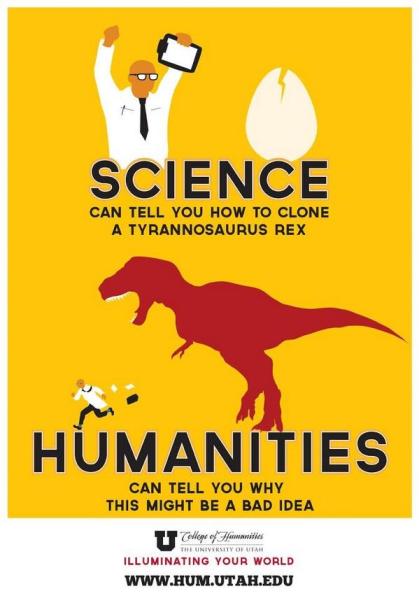In the last few days, I've noticed
some stirrings of irritation about a more visible trend of debasing literature
and the humanities in favor of expanding interest in what are called the STEM
fields (science, technology, engineering, math). Being married to a STEM person
(an eighth grade science teacher) and coming from a humanities background
myself, I can see why there's controversy.
This ad from Wells Fargo rolled out and
then back within a day, which shows kids who were once involved with the
humanities now enjoying the STEM careers. Aside from the fuzzy thinking on how,
exactly, a bank is helping kids have
any career ("Hey, you know how crippling student debt is? Why not support
the institutions that helped make that happen in the first place!"), it
shows a knee-jerk value system that the bank is not only upholding (via their
reliance on it to communicate their message quickly), but is also validating the
system (via the additional subtext, assumptions, and deliberate--and ironic,
considering what they're disparaging--visual design). The dismissal of the
humanities as being "lucrative" careers and, therefore, worthwhile careers, is a major problem.
This image* helps show, with a
delightful shout-out to dinosaurs, why it's so important to have a holistic--dare
I say, classical?--approach to education. My bedrock critique of capitalism is
summed up by Matt Embree of the Rx Bandits: "We're finding out that we
know better/ No number will ever replace me." Modern post-capitalist economy
demands interchangability of parts with widespread ubiquity of interfacing.
Cogs in machines at least have determinate characteristics--of being cog-like.
What's disgustingly demanded now is not even to have characteristics, but to be
programmable.
Insisting that STEM is all there is
in the future is damaging--what's the future for if not to progress the
entirety of mankind? Poetry and drama, literature and art are all as much a
part of the human experience as developing algorithms and defining the world in
ever increasing detail. The problem with the kind of ad that Wells Fargo put
out isn't that it's valuing STEM, it's that the zero-sum application of
thinking is reality. It's not. You can have artistic scientists (if you don't
believe me, check out my wife's costumes) and you can have scientific artists
(look at the kinds of literature we get when people like Michael Crichton or
Robin Cook get involved). There isn't a binary here, and there isn't a
privilege. Health education--from PE to sex ed--are also critical, and no child
should be discouraged from pursuing something that she finds exciting simply
because a financial component is not immediately apparent. People have been
saying this for years, but no one really seems to believe this: Money does not
provide worth. It is simply the easiest means by which we can explore being
human. This is why education needs to be funded better: So that the end purpose
of life isn't about making more money.
We aren't numbers; we're people.
That's what we learn by reading literature and exploring the arts. The
humanities are named this way, in part, because it shows how interconnected we
are--how profoundly, movingly interconnected we are while sharing breaths on
this pale blue dot.
Toxic maligning of any aspect of
human endeavor--particularly in an attempt to create a value based upon diminishment--is
hardly the kind of message that ought to be perpetuated, and that goes as much
for a bank as it does politicians, teachers, or anyone.
---
* Interestingly, the science community was bothered by this image, seeing it as disparaging against science ("Scientists are too stupid to realize why a T. rex shouldn't be cloned, is that what they're saying?"). I can see the point of view, but there's definitely a tongue in cheek approach, coupled with the subjunctive "might be" as pointing out that the domains of ethics--including bioethics--and philosophy is within the purview of the humanities. For me, that's why it's more inclusive than disparaging: The point is that we have different disciplines for a reason. I recognize differing opinions, but I don't think the U of U's advertisement is doing the same thing as the Wells Fargo ad.


Comments